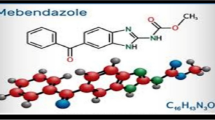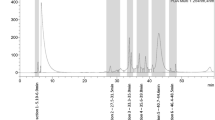Summary
Flavonoids are polyphenolic compounds that occur ubiquitously in foods of plant origin. Their proposed protective role in tumor development may prevail especially in the intestinal tract due to direct exposure of intestinal epithelia to these dietary ingredients. We have screened more than 30 flavonoids for their effects on cell proliferation and potential cytotoxicity in the human colon cancer cell lines Caco-2, displaying features of small intestinal epithelial cells, and HT-29, resembling colonic crypt cells. In addition, for selected compounds we assessed whether they induce apoptosis by determining caspase-3 activation. Studies on the dose dependent effects of the flavonoids showed antiproliferative activity of all compounds with EC50 values ranging between 39.7 ± 2.3 μM (baicalein) and 203.6 ± 15.5 μM (diosmin). In almost all cases, growth inhibition by the flavonoids occured in the absence of cytotoxicity. There was no obvious structure-activity relationship in the antiproliferative effects either on basis of the subclasses (i.e., isoflavones, flavones, flavonols, flavanones) or with respect to kind or position of substituents within a class.
In a subset of experiments we examined the antiproliferative activities of the most potent compound of each flavonoid subgroup in addition in LLC-PK1, a renal tubular cell line, and the human breast cancer cell line MCF-7. Out of four flavonols tested, three displayed almost equal antiproliferative activities in all cell lines but fisetin was less potent in MCF-7 cells. The flavanones bavachinin and flavanone inhibited growth of Caco-2 and HT-29 cells with lower EC50 values than that obtained in LLC-PK1 and MCF-7 cells. The lower susceptibility of LLC-PK1 and MCF-7 cells towards growth arrest was even more pronounced in the case of the flavone baicalein. Half maximal growth-inhibition in LLC-PK1 and MCF-7 required 2.5 and 6.6 fold higher concentrations than that needed in the intestinal cell lines. The flavonoids failed to affect apoptosis in LLC-PK1 and MCF-7, whereas baicalein and myricetin were able to induce apoptosis in HT-29 and Caco-2 cells.
In conclusion, flavonoids of the flavone, flavonol, flavanone, and isoflavone classes possess antiproliferative effects in different cancer cell lines. The capability of flavonoids for growth inhibition and induction of apoptosis can not be predicted on the basis of their chemical composition and structure.
Similar content being viewed by others
Author information
Authors and Affiliations
Additional information
Received: 28 December 1998, Accepted: 18 March 1999
Rights and permissions
About this article
Cite this article
Kuntz, S., Wenzel, U. & Daniel, H. Comparative analysis of the effects of flavonoids on proliferation, cytotoxicity, and apoptosis in human colon cancer cell lines. Eur J Nutr 38, 133–142 (1999). https://doi.org/10.1007/s003940050054
Issue Date:
DOI: https://doi.org/10.1007/s003940050054




